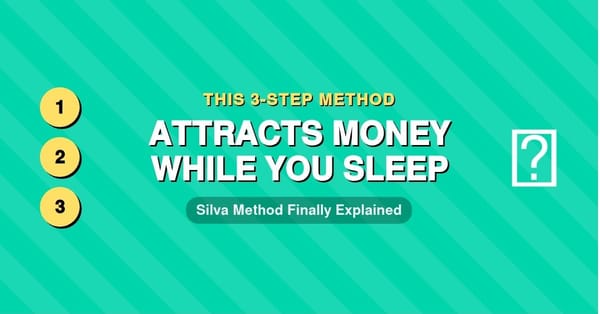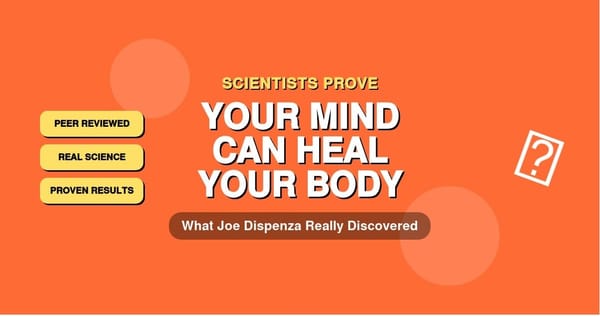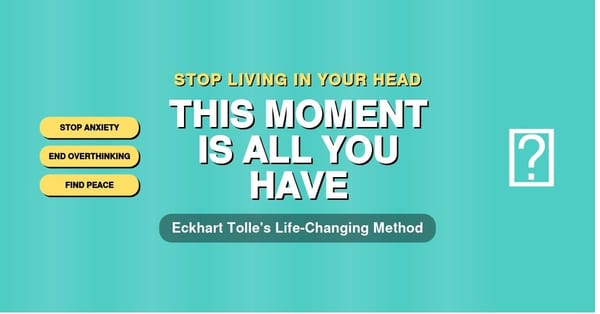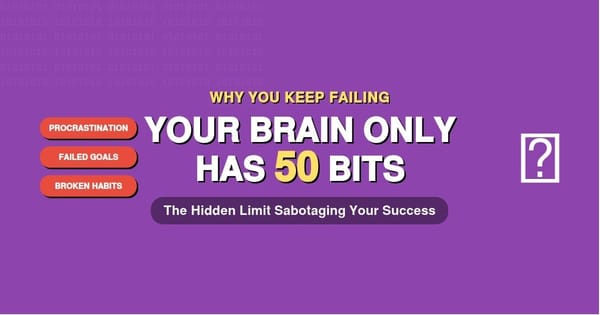Why Getting Sick Might Be Your Biggest Growth Opportunity
Every chronic illness follows the same 12-step journey from victim to healer. Here's how to recognize which stage you're in and what comes next.
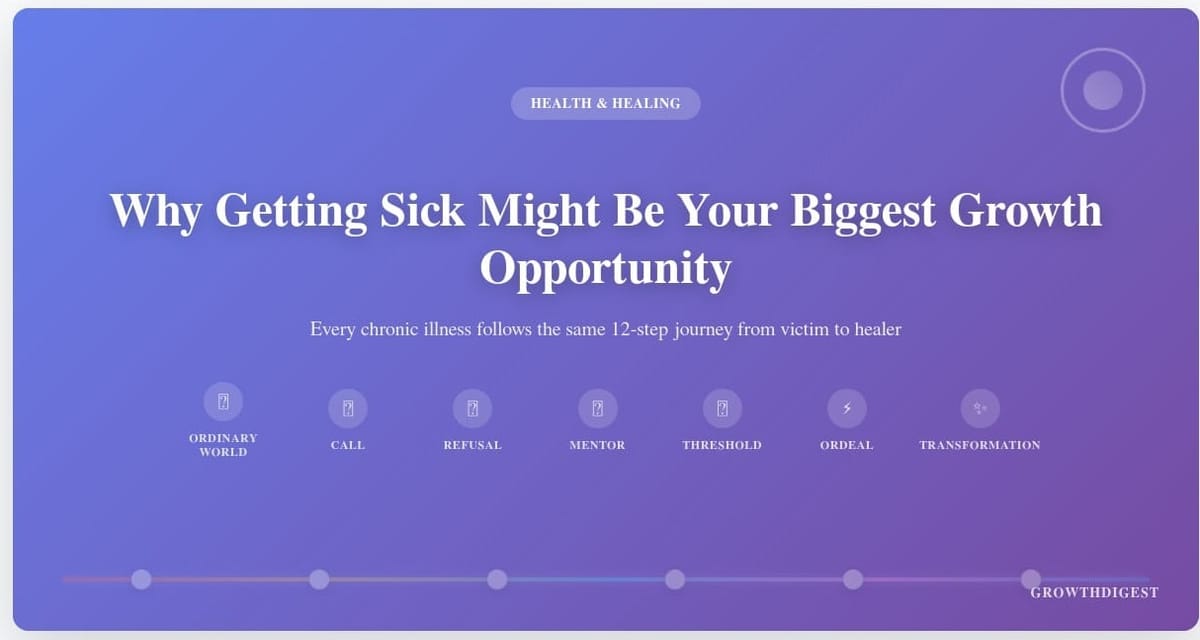
Your health struggles aren't random. They're following an ancient pattern of transformation.
The Day Everything Changed
Sarah woke up with stomach pain. Again.
For the third time this week, she called in sick to work. Her friends stopped inviting her out because she always canceled last minute. Her family kept saying "it's just stress" or "maybe try yoga."
But deep down, Sarah knew something bigger was happening. This wasn't just about her stomach.
Sound familiar?
If you're dealing with ongoing health issues—whether it's digestive problems, anxiety, migraines, or autoimmune conditions—you're not just sick. You're actually on a journey. A very specific journey that humans have been taking for thousands of years.
It's called the Hero's Journey.
What Is the Hero's Journey?
A smart guy named Joseph Campbell studied stories from around the world. Greek myths, fairy tales, movies like Star Wars. He found something amazing: every single hero story follows the same pattern.
The hero starts normal. Gets a challenge. Fights it. Learns something. Comes back stronger.
Campbell called this pattern the "Hero's Journey," and it has 12 steps.
Here's what he didn't say but what I've learned: Your health problems follow this exact same pattern.
You're not just managing symptoms. You're transforming into someone new.
Let me show you how.
Stage 1: Life as You Know It (The Ordinary World)
This is where your story starts. You've gotten used to feeling:
- Tired all the time
- Worried about flare-ups
- Limited in what you can do
- Like your body is working against you
You've built your whole life around your symptoms. You know which foods to avoid, which situations trigger you, and which excuses to make when you can't show up.
This becomes your normal. Not good normal, but familiar normal.
Why we stay here: Because familiar feels safe, even when it doesn't feel good.
Stage 2: Something Has to Change (The Call to Adventure)
Then something happens that makes you think, "I can't live like this anymore."
Maybe it's:
- A really bad flare-up that scares you
- Missing another important event
- Reading about someone who healed naturally
- A doctor saying "learn to live with it"
- That moment at 2 AM when you're researching your symptoms again
This is your wake-up call. Your body is asking you to pay attention.
The call always sounds like: "What if there's another way?"
Stage 3: But What If It Doesn't Work? (Refusal of the Call)
Of course you don't want to answer the call. Because healing means:
- Admitting you might have to change everything
- Spending money on treatments that might not work
- Getting your hopes up
- Taking responsibility for your health
You tell yourself things like:
- "I don't have time for that"
- "Insurance doesn't cover it"
- "My doctor knows best"
- "This is just genetic"
The real fear: What if I try everything and nothing works? What if I'm stuck like this forever?
Stage 4: Finding Your Guide (Meeting the Mentor)
Then help shows up. Your mentor might be:
- A new doctor who actually listens
- A book that explains your symptoms differently
- A friend who got better naturally
- A therapist who gets it
- Your own intuition getting louder
The mentor doesn't fix you. They show you a new way of thinking about your body.
Instead of "your body is broken," they help you see "your body is trying to tell you something."
The mentor's gift: Hope with a plan.
Stage 5: I'm Going to Try This (Crossing the First Threshold)
This is when you decide to actually do something different. Maybe you:
- Book that functional medicine appointment
- Start an elimination diet
- Begin therapy
- Try meditation
- Say no to things that drain you
It feels scary because you're leaving familiar territory. But you do it anyway.
This is where real healing starts. Not with a pill, but with a decision to put your health first.
Stage 6: Nothing Is Simple (Tests, Allies, and Enemies)
Welcome to the messy part. This stage brings:
Challenges:
- Symptoms getting worse before they get better
- People questioning your choices
- Expensive treatments
- Slow progress
- Wanting to give up
Support:
- Your body starting to respond
- Finding practitioners who care
- Meeting others on similar journeys
- Small victories that keep you going
Resistance:
- Family who think you're "obsessed"
- Your own impatience
- Old habits trying to come back
- Doctors who dismiss your progress
Remember: Healing isn't a straight line. It's messy, slow, and full of ups and downs.
Stage 7: The Thing You've Been Avoiding (Approach to the Inmost Cave)
Here's where it gets real. You start realizing your symptoms might be connected to:
- Old emotional wounds
- Stress you've been ignoring
- Relationships that drain you
- Perfectionism that never stops
- Trauma you thought you'd moved past
This is scary because it means your illness isn't just physical. It's asking you to look at your whole life.
The big question: What would I have to deal with if I wasn't busy managing symptoms?
Stage 8: Everything Falls Apart (The Ordeal)
This is usually the hardest part. You might experience:
- Old emotions coming up
- Feeling worse as your body detoxes
- Realizing how much of your identity was built around being sick
- Family dynamics changing as you get stronger
- Grieving the time you lost to illness
It feels like you're falling apart. But you're not.
You're breaking open so you can heal.
The ordeal teaches you: You're stronger than your symptoms. You're more than your diagnosis.
Stage 9: The Light at the End (The Reward)
Slowly, things start to change. Not just your symptoms, but how you see yourself:
- You understand what your body needs
- You can handle stress without getting sick
- You have energy for things you enjoy
- You trust your body instead of fearing it
- You feel like yourself again (maybe for the first time)
The real reward isn't perfect health. It's a new relationship with your body where you're partners, not enemies.
Stage 10: Living What You've Learned (The Road Back)
Now you have to integrate everything into regular life:
- Making healthy choices from love, not fear
- Setting boundaries without feeling guilty
- Handling setbacks without panic
- Maintaining new habits when life gets busy
The challenge: Old patterns will try to come back, especially during stress. The difference is now you have tools, not just survival tactics.
Stage 11: I Am Not My Illness (Resurrection)
This is when your identity completely shifts. You're no longer:
- "The person with IBS" but someone who understands their digestive system
- "The chronic pain sufferer" but someone who knows how to support their body
- "The anxious one" but someone who's learned to calm their nervous system
You might still have challenging days, but they don't define you anymore.
You're not cured—you're transformed.
Stage 12: Helping Others Heal (Return with the Elixir)
The final stage is sharing what you've learned:
- Telling your story to give others hope
- Helping friends understand mind-body connection
- Simply showing people what's possible
- Maybe even becoming a healer yourself
You don't have to become a health coach. You just have to live as proof that healing is possible.
Your story becomes medicine for others.
Where Are You Right Now?
As you read this, you might see yourself in several stages. That's normal. You might be in stage 8 with your physical symptoms while in stage 5 with emotional healing.
Ask yourself:
- What health challenge is calling for your attention?
- How are you avoiding the call to heal?
- Who or what could be your mentor?
- What are you afraid to face about your illness?
- How could your story help someone else?
The Truth About Healing
Here's what took me years to understand:
Healing doesn't mean perfect. It means whole. It's not about never having symptoms. It's about having a different relationship with them.
Your body isn't broken. It's adapted to protect you from something. Your symptoms aren't mistakes—they're messages.
You don't have to choose sides. The best healing combines medical care with lifestyle changes, conventional wisdom with alternative approaches.
Healing is a way of living. It's listening to your body, honoring your emotions, and creating a life that supports your wellbeing.
You are not your diagnosis. You're a whole person with an amazing ability to heal, grow, and transform.
Your Journey Starts Today
If you're dealing with chronic health issues right now, you're already on the hero's journey. The fact that you're reading this, looking for answers, wondering if things could be different—that's your call to adventure.
You don't need to see the whole staircase. You just need to take the first step.
Maybe that's:
- Finding a doctor who treats root causes, not just symptoms
- Starting a food diary to track patterns
- Beginning a simple meditation practice
- Reading one book about mind-body healing
- Saying no to one commitment that drains you
Remember: Every hero starts as an ordinary person with an extraordinary challenge. What makes them a hero isn't being fearless. It's being brave despite the fear.
Your body is not your enemy. Your symptoms are not your identity. Your illness is not your destination.
You are on a journey. And every journey—even the hard ones—can lead to something beautiful.
The world needs your healing story. Not just for you, but for everyone who needs to know that transformation is possible.
What's Your Next Step?
Take a moment to think about where you are in your healing journey. Are you still in the "ordinary world" of just managing symptoms? Have you heard the call to do something different? Are you in the messy middle of trying new approaches?
Wherever you are, it's exactly where you need to be.
Your healing journey is uniquely yours. But you don't have to walk it alone.
What stage of the health journey feels most familiar to you right now? Share your story—it might be exactly what someone else needs to hear today.
